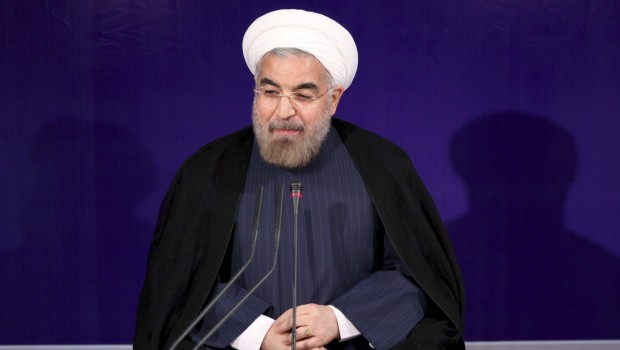
Iranian President Hasan Rouhani speaks in his first press conference since taking office, at the presidency compound in Tehran, Iran, Tuesday, Aug. 6, 2013 (AP Photo/Ebrahim Noroozi)
The candidate, Seyed Mahmoud Alavi, a member of the Council of Experts—an elected body made of clerics tasked with supervising and selecting Iran’s supreme leader—gave an interview to Khorshid, a pro-Ahmadinejad daily news service, after the June 14 presidential election. In the interview, he criticized both the disqualification of former president Ayatollah Hashemi Rafsanjani from the race, as well as Iran’s current domestic policies, which he said stifled free speech.
His comments angered some conservatives, especially from radical members of the “principalist” faction, who remain opposed to change course in domestic politics, and have worked assiduously to marginalize Hashemi Rafsanjani, seen in many quarters as a pragmatic centrist whose endorsement of Rouhani contributed to his decisive first-round victory.
Principalists also hold a large number of seats in Iran’s parliament, the body which must approve Rouhani’s choice of ministers before they can take office, although increasingly many principalist MPs are expressing their support for President Rouhani.
The process of voting on Rouhani’s candidates is dues to begin next week.
The dissemination of Alavi’s interview in recent days is seen as damaging chances of a smooth vote of confidence. In an attempt at damage control, his office issued a statement which attempted to brush aside the interview as irrelevant, and rejected any link between what was said in the interview and his current status as a cabinet nominee.
Throughout the interview Alavi, robustly defends the overall structure of the state and even lauded the role of the Guardian Council in vetting the candidates. However, he explicitly rejects the disqualification of Ayatollah Hashemi Rafsanjani, the former Iranian president and current chairman of Expediency Council.
Alavi described Rafsanjani as “not merely [a] politician, but a political and religious architect whose benefits for the country is essential.”
“Ayatollah Rafsanjani’s qualification for the post was higher than anyone, but he was rejected by the Guardian Council, a political move that is not in the merits of the council as a state institution,” Alavi said.
Prior to service on the Council of Experts, Alavi was head of “political and ideological division” of Iran’s army, a division that oversees the loyalty and devotion of both the rank and file and commanders to the principles of Islam and the Islamic revolution. He was appointed to the post by Ayatollah Khamenei, and served from 2000 to 2009.
As a cleric and scholar of Islamic jurisprudence, or mujtahid, he also fulfills the legal requirements to serve as minister of intelligence according to Iranian law, which stipulates that the minister should be a cleric qualified to make decisions that might have judicial ramifications.
